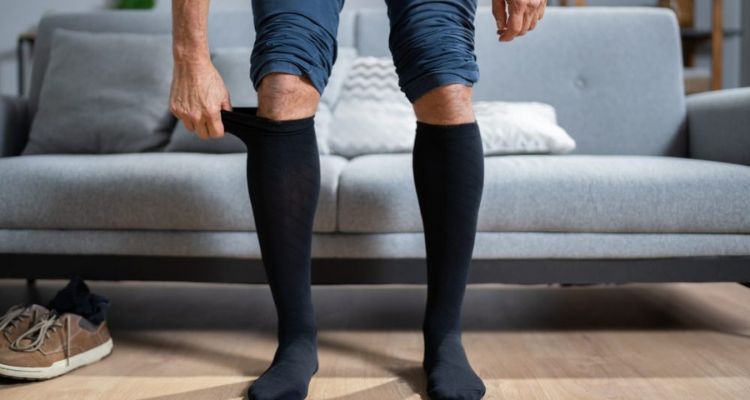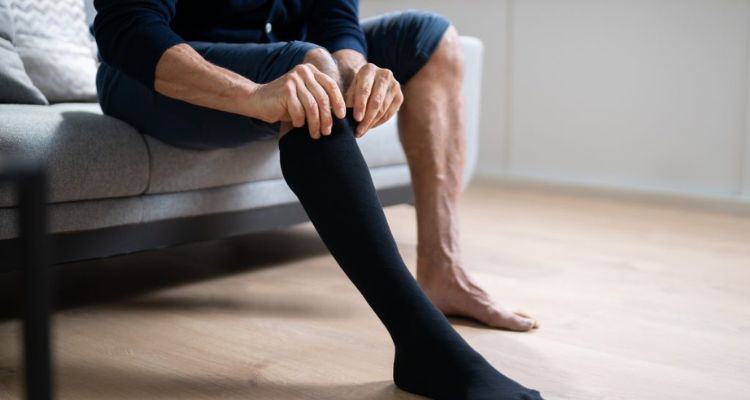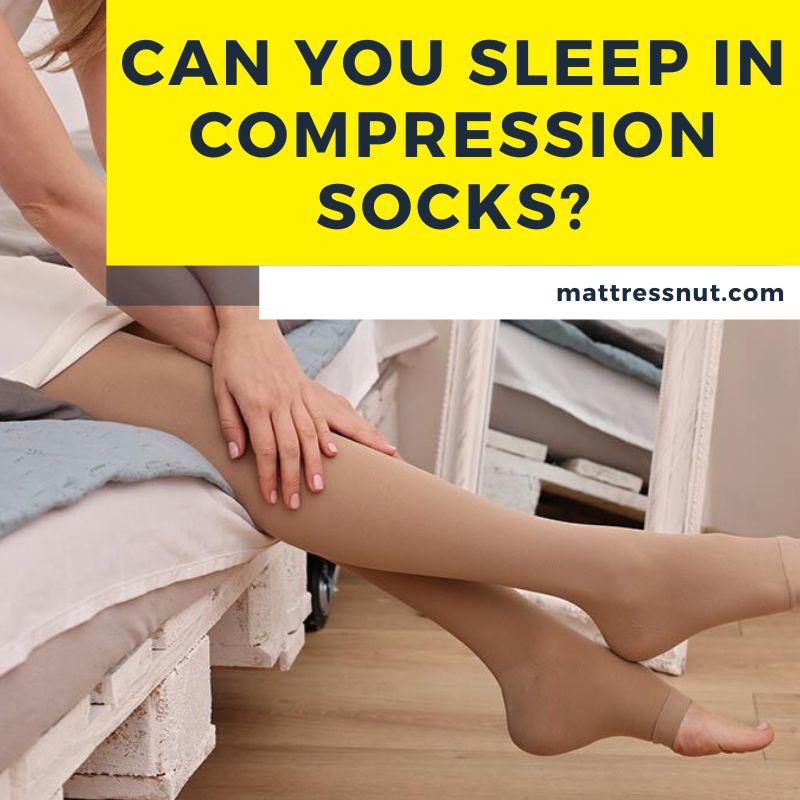Compression socks are all about their squeeze, and wearers love it. They used to be associated with older adults, but now they are becoming trendy. These socks are handy for athletes and long-distance travelers.
These socks can also help reduce swelling and boost blood flow. Athletes use these socks as a recovery tool after their workout. So there are various benefits of these socks, but can you sleep in them?
We will explore this matter in today’s guide, so keep reading till the end and find out if your legs bear the 24/7 squeeze.
Key Takeaways
Healthy people should not wear compression socks while sleeping, as the legs do not need assistance fighting gravity when lying down. Compression socks can disrupt circulation during sleep.
- Compression socks are beneficial when worn during the day by people with venous disorders, as they aid circulation.
- People with sleep apnea may find wearing compression socks at night reduces symptoms.
- Those with orthostatic hypotension can prevent fainting in the morning by wearing socks overnight.
What Do These Compression Socks Do?
These compression socks compress your muscles along with veins in your legs. They are suitable for people dealing with certain venous disorders or athletes who engage in different activities.

These socks are elastic and come in different sizes and shapes to accommodate everyone. The strength and elasticity of these socks guarantee strong compression on your feet, legs, and ankles.
How Do These Compression Socks Work?
Thanks to that tightening elastic construction, these socks compress the surface arteries and veins through your legs (the area they cover) around your muscles. As a result, blood flows efficiently right along those narrow channels.
In other words, blood pressure or arterial pressure increases in those arteries and prevents the blood from pooling in this region of your body. With the compression, blood flows smoothly, preventing muscle soreness and any lactic acid build-up.
These compression socks are available in two different kinds. One is knee-high compression socks or stockings. This part compresses the area that is under your knees. While the second kind of these compression socks is thigh-high stockings. These compress your leg downwards from your thigh.
Sleep Apnea & Compression Socks
Those who don’t know your grandparents used to love wearing these compression socks because they help with sleep apnea (also check 8 amazing mattresses for sleep apnea). This information is spreading fast these days, and that’s why more and more people, including athletes and younger people, prefer to wear these socks during sleep.
Sleep apnea treatment needs a continuous positive airway pressure (CPAP) unit, hoses, and mask each night. Many people who have to deal with sleep apnea also have a lot of trouble with the CPAP machine.
In some cases treating obtrusive sleep apnea with surgical or dental appliances is effective. But such an appliance needs to be as convenient as a CPAP machine. Therefore, people suffering from sleep apnea must look for alternatives, including compression socks.
One group was told to stop wearing the socks, and the second group was told to start wearing the socks for one week. According to a research, compression socks recessed the size of the leg veins of the participants by more than 60 percent.
And wearing these socks during sleep also reduced the size of the neck veins by 60 percent. With the neck veins, shrinkage resulted in less pressure on the windpipe and reduced snorting, snoring, and breathlessness linked with sleep apnea in both groups.
So, according to this study, compression socks reduce sleep apnea by 36 percent. Not that it’s not a cure, but it certainly is a step toward reducing sleep apnea. And, of course, the cost of compression socks is much lower than a CPAP machine which costs thousands of dollars.
Orthostatic Hypotension & Compression Socks
Apart from treating sleep apnea, compression socks at night can help people with orthostatic hypotension. It is a condition that causes dizziness. Complete loss of consciousness can occur when you stand up from lying down.
People with this condition might pass out entirely in the morning when they get out of bed. And, of course, falling flat on the floor completely unconscious is not the right way to start your day.
During sleep, compression socks keep blood flowing back from your leg veins to your brain and heart. And this prevents the hypotension from occurring.
Of course, compression socks don’t have any side effects, and they are inexpensive if you compare them with various other blood pressure drugs. We are not saying you should stop using your prescribed drugs altogether to deal with hypotension or sleep apnea.
It’s better to consult with your doctor; in most cases, you will be told that it’s okay to wear these socks all night. But make sure to continue your other treatments as well. You will feel much better when you get up in the morning, which makes these compression socks worth it.
Can you Wear Compression Socks for General Purpose
It’s fine to wear your compression socks for 24 hours. But you shouldn’t keep wearing the same compression socks 24/7.
It’s essential to maintain personal hygiene as well. So, you must wash your legs at least once a day, especially if you have sensitive skin.
Changing your socks is a good practice, too, for maintaining your hygiene. The best way of doing this is to wear one pair of compression socks during the daytime and another pair during the nighttime.
Don’t just keep wearing them throughout the day and night; expect them to treat your veins with a miracle. Compression is not that useful when you are lying down. Venous compression assists your leg veins in dealing with the gravity force.
And when you are lying down, those valves in your leg veins are not as stressed as when you are standing or sitting. Therefore, any added effects of these socks won’t be noticeable for issues such as varicose veins or venous reflux disease.
But in the case of other conditions mentioned earlier in this article, the difference is noticeable, and you will feel much better even if you wear these socks at night for your leg vein issues. It is best to consult your doctor about wearing these socks for better guidance.
The Impact of Compression on Sleep
According to another study that involved men with obstructive sleep apnea, these socks need not be worn to influence sleep quality. A better practice is to wear them during the daytime to combat the hypopneas and apneas you might experience during sleep.
These sleep disturbances occur due to fluid displacement from your legs to your neck as you lay down on your bed. Compression socks reduce the overall fluid volume in your legs and prevent fluid accumulation in your neck (also check the top rated pillows for neck and shoulder pain).
The study measured the fluid displacement from the legs to the neck by measuring neck circumference and the number of apneas during sleep. And with the help of compression socks, both these numbers improved.
Is It Fine to Wear These Compression Socks During Sleep?
Generally speaking, you should not wear compression socks during sleep if you are a healthy individual. There is no reason to wear these socks if you don’t have any venous or muscle issues. However, you can wear them during day time when you are active.
Even those diagnosed with various venous problems must consult their doctors first before they start wearing these socks at night. Compression socks come in different tightness in their elastics. And there are different pressure standards for these compression socks as well.
For instance, low compression is below 15 mmHg, and mild compression is between 15 to 20 mmHg. Moderate reduction is 20 to 30 mmHg, and high compression is above 30 mmHg.
Here, mmHg stands for mercury millimeters. It is the standard for measuring pressure used for the pressure put on a surface. You should only wear moderate as well as high compression socks during the daytime and when you are doing some strenuous workouts.
Your doctor might tell you to wear compression socks during the night if you have undergone surgery related to the spine or legs. Besides that, you should only wear your compression socks during day time. Similarly, you can wear your low or mild compression socks at night but only with your doctor’s advice.
Once again, you shouldn’t wear these compression socks during sleep if you are healthy. However, wearing these socks before and after some intense workouts for short sessions is fine.

Compression Socks – Why Not Wear Them During Sleep?
At the beginning of this guide, we discussed how these socks work and what purpose they fulfill, right? Well, tis’ time to get a bit scientific about it. You are mostly in an upright position when you use these socks during the day.
Your veins and arteries have to deal with the force of gravity. Now, if you have a condition like some venous disorder, it will be hard for the vents to circulate blood back into your neck efficiently.
But with the help of graduated compression, your blood circulatory system gets enough pressure to fight gravity and avoid any major disruption in circulation. However, when you are sleeping, your body is fully horizontal, so your body doesn’t have to fight gravity.
And if compression is applied to your legs during this time, it can disrupt blood circulation. As a result, it can cause muscle pain and inflammation in your ankles and legs.
Conclusion:
Without your doctor’s advice, you shouldn’t wear compression socks during sleep. And this is the case if you have any muscle or venous problems.
Healthy individuals should never wear compression socks during their sleep. They can wear them before and after a physical workout for a short period (also check the best selling mattresses for athletes).
Moreover, don’t wear compression socks round the clock. It is essential to maintain personal hygiene. Plus, the good practice is to have separate socks for the day and night.
Sleep in compression socks FAQs
Why shouldn't I wear compression socks when I sleep?
If you are a healthy individual, you shouldn't wear these socks during sleep because, at that time, your leg veins don't have to deal with a gravitational pull, as is the case when you are active during the daytime.
So, additional pressure exerted by compression socks might result in ankle and leg pains. You should only wear these socks at night with your doctor's advice. And this is even the case if you have any venous problems.
How long should I wear compression socks?
You should wear compression socks with your doctor's advice in case of any venous issues. But even in such scenarios, you should wear your socks 24/7. Healthy individuals can only use these socks for a short time before and after some physical workout.
Is there any harm if you keep wear compression socks 24/7?
Whether you have any venous or measles issues or not, you can't keep wearing your compression socks 24/7. It is essential to maintain personal hygiene and wash your legs as well as your socks. If your doctor has advised you to wear compression socks during nighttime, you should have a separate pair for night and day.

